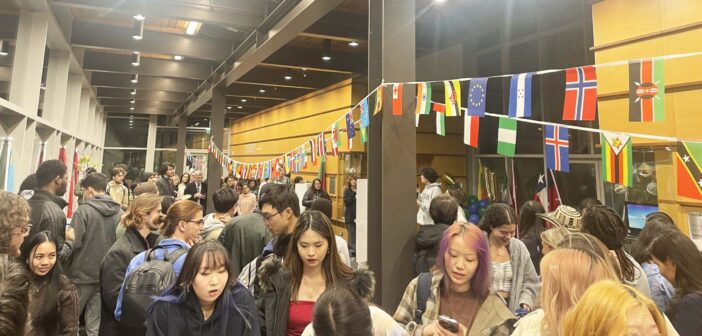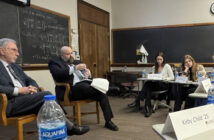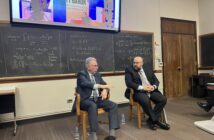There are nearly 1,000 international students from 91 countries at Lehigh, and about 800 students traveled abroad in the 2023-2024 academic year, according to Lehigh data reports.
The university is celebrating these students, and global education, this week through International Education Week.
Karin Fischer, a senior writer for the Chronicle of Higher Education, gave a keynote address on Nov. 19 in the Linderman Library as part of this week-long celebration. She spoke to students, faculty and staff about the current and future state of international higher education, drawing on her previous work as a political reporter and current role examining global educational policies.
Fischer’s speech highlighted the ways education and politics interact and reflect on potential changes under President-elect Donald Trump’s leadership.
“International education has always been influenced (by) and been part of politics,” she said. “International education means to explain things and to make sense of globalization and to your understanding of the world around you.”
She said changes in foreign policy, domestic education policy and immigration restrictions will likely impact the flow of international students into the U.S., especially for students from contentious areas such as China and Russia.
She also discussed the skepticism surrounding higher education globally, as fewer people trust institutions and the education divide widens.
Part of this divide is due to the steady increase in cost. Adjusted for inflation, tuition has increased 197.4% since 1963, according to the Education Data Initiative, and Fischer said obtaining a degree has created divides between those who are able to access it and those who cannot afford it.
However, she said much of the skepticism stems from a perception of universities as elitist institutions disconnected from the general population. She said this distrust of universities causes distrust in experts in many fields such as scientists and economists, as they come from academia.
“I think in this day and age where we’re having real conversations about this skepticism of expertise, I think that’s influencing these views on college as well,” Fischer said.
She said she encourages educators to work toward a more diverse and inclusive approach to studying abroad.
She said many students are affluent and White and travel to European countries. However, she hopes for a more accurate representation of the students who attend colleges and said there needs to be improvements in accessibility for these students.
Refilwe Moahi, ‘25G, said she was drawn to Fischer’s speech because she was curious about how the recent election might affect international education.
She said she found Fischer’s discussion of the experience of American students while abroad to be especially interesting, as she studied abroad during her undergraduate studies. While taking classes in France and China, she said she was surrounded by American students and felt she didn’t get to thoroughly experience local cultures.
“I don’t think that as an American student going abroad, you should still be getting the same perspectives that you would be getting here,” Moahi said.
Katherine Lavender, the interim vice president for student affairs and the dean of students, also attended the event and said she came to learn more about Fischer’s work.
“It was a great opportunity to hear from someone with a really important lens in the field and potential impact for what changes in the environment can mean for students,” Lavender said.
International Education Week events organized by the Office of International Affairs will continue through Friday.






Comment policy
Comments posted to The Brown and White website are reviewed by a moderator before being approved. Incendiary speech or harassing language, including comments targeted at individuals, may be deemed unacceptable and not published. Spam and other soliciting will also be declined.
The Brown and White also reserves the right to not publish entirely anonymous comments.